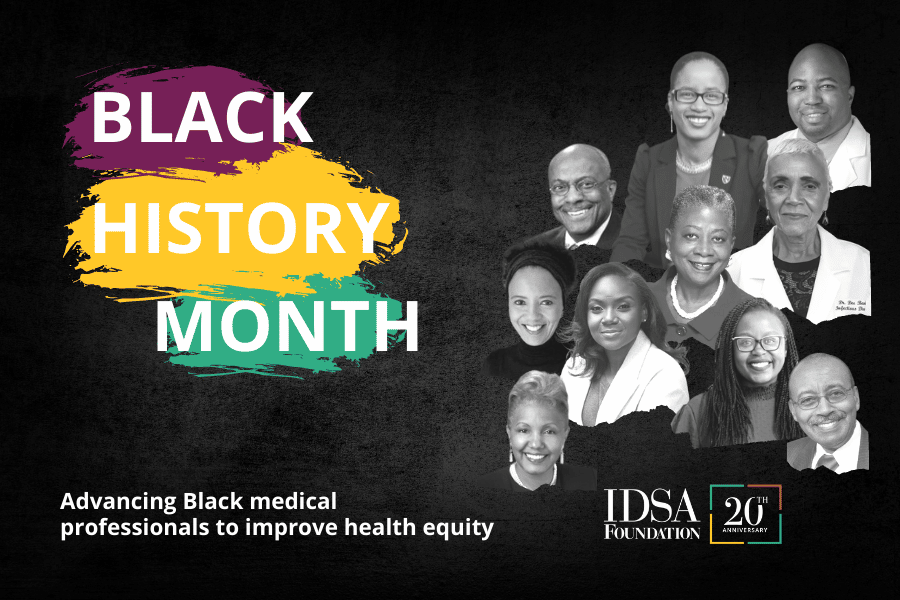Advancing Black medical professionals to improve health equity
Officially recognized by the U.S. government in 1976 by President Gerald Ford, Black History Month serves as a time to acknowledge and celebrate the essential achievements of Black Americans across all time periods in the U.S. The concept of dedicating time to educate the public about the often-forgotten accomplishments of Black Americans was first introduced in 1926 by historian Carter G. Woodson to promote Black history as an integral part of U.S. history.
Today, Black History Month also serves as an opportunity to raise awareness of where systemic racism remains and the struggle Black Americans still face across all industries. Unfortunately, health care is not immune.
According to the most recent data from the Association of American Medical Colleges, only 5% of all active U.S. physicians in 2018 identified as Black or African American. Within infectious diseases, less than 6% of female ID specialists and less than 5% of male ID specialists self-reported as Black or African American. These disparities affect not only creativity and innovation within the ID field but also the populations who are in need of ID specialty care.
“For too long now, the deeply embedded themes from structural racism have seen Black and Brown communities disproportionately affected by many diseases, creating worse health outcomes and ultimately poorer quality of life,” said Matifadza Hlatshwayo, MD, MPH, an international expert in infectious diseases focused on marginalized populations and director of health for the city of St. Louis. “These communities are overdue for physicians, researchers and public health advocates that will dedicate their careers to rigorous scientific research, policy and subsequent interventions to result in health equity.”
There are scars that remain to be healed from the health injustices that have been imposed on Black Americans. But history must note the pioneers who broke barriers to conduct research, discover treatments and provide leadership, paving the way for future ID professionals.
The IDSA Foundation salutes the life-saving work of Black Americans in the field of ID and is committed to widening the pathway to impactful ID careers for Black medical students and trainees to become future ID leaders. Our goal is to build an ID workforce that mirrors our communities to provide the best possible care across diverse patient populations.
As we acknowledge the journeys of Black Americans in medicine, here are three ways we can address health care disparities in the field of infectious diseases.
1. Delivering culturally competent care
Culturally competent care refers to the ability of medical providers to offer care that considers each patient’s social, cultural and linguistic needs. This may mean offering translation services for patients who don’t speak the same language, developing treatment plans around an individual’s religious beliefs and using terms the patient can understand.
Cultural competency is essential for effective health care of diverse populations, which means it is an important factor in achieving health equity. This is especially important in the wake of the COVID-19 pandemic, when many different beliefs exist about vaccines, treatments and the trustworthiness of physicians and scientists. Historical distrust of medical professionals among Black people can be a huge barrier to seeking necessary health care. Diversity in clinical trials is just as crucial as treatment and vaccine uptake to ensure treatment and prevention strategies are effective across races and other demographics.
Cultural competence also needs to remain at the forefront of public health education to ensure all people have access to information they can understand. This understanding is key to helping them make informed and confident decisions about their health.
2. Advancing Black medical professionals
Expanding the number of Black medical professionals who enter the ID specialty ultimately leads to greater diversity and representation in the field. Scientific exploration that produces new life-saving treatments and prevention strategies depends on the innovative thoughts and creativity of diverse minds. Advancing the ID field is not possible without expanding representation.
“During my ID fellowship, I did not see a lot of Black ID physician role models, and I started to think that I was alone,” said Jasmine Riviere Marcelin, MD, FACP, FIDSA, assistant professor of infectious diseases at University of Nebraska Medical Center. “I learned that there were 3-4% of ID physicians who were Black, and I wondered where they were. I support the IDSA Foundation because I want to help build a more equitable future for IDSA that attracts and retains more ID docs who look like me.”
In its quest to attract more young practitioners to the field of ID medicine, the IDSA Foundation is emphasizing initiatives that encourage Black medical students and trainees to consider ID as their subspeciality. In 2020, the Foundation unveiled the Dr. George W. Counts Conference Room to support Black medical students and residents and provide them with the resources and mentorship needed to pursue a career in ID. This year, donations raised will fund travel grants for Black medical students and residents to attend IDWeek 2022.
3. Continual improvement and discussion
Perhaps one of the biggest things to remember when it comes to advancing health equity is that our work is never finished. There are always areas and ways for improvement, and these discussions should extend far beyond the confines of Black History Month.
One of the ways the Foundation is continuing to honor the work of Black ID trailblazers year-round is through the Dr. George W. Counts Conference Room. This space honors renowned ID mentor, visionary and leader George W. Counts, MD, FIDSA, and his life’s work in ID to end disparities among Black people in education, training, research and academic advancement. Funds raised through the conference room are used to ignite and sustain interest in ID research and medicine among Black professionals and other historically marginalized populations.
“As a past chair of the George W. Counts Memorial Minority Interest Group of IDSA, I fully embrace the mission of IDSA to promote science, good clinical practice, inclusion and diversity,” said Vladimir Berthaud, MD, MPH, CPH, FACP, DTMH, FIDSA, director of the Division of Infectious Diseases and co-associate director of the Clinical Science Core at Meharry Medical College. “IDSA and the IDSA Foundation have enriched my professional life as well as honed my skills as a clinical practitioner and academician. I congratulate the leadership of the George W. Counts Interest Group for investing in the recruitment of IDSA members, advancement to fellowship, and advocating for health equity and the elimination of infectious diseases disparities.”
By focusing on cultural competence in infectious diseases care, advancing Black medical professionals and continuing to analyze and discuss persistent disparities that Black patients and practitioners face, we can improve health equity for people around the world who could benefit from effective and appropriate infectious diseases care. The Foundation remains committed to the recruitment, mentorship and professional development of early-career Black practitioners to create additional pathways to impactful and fulfilling ID careers.
—
Celebrate Black History Month by helping us increase diversity and representation in the field of ID to advance health outcomes for Black communities. Make a gift to the George W. Counts Conference Room today!

